Open Planning of Sanitation Systems
Open Planning of Sanitation Systems
Open Planning of Sanitation Systems
Create successful ePaper yourself
Turn your PDF publications into a flip-book with our unique Google optimized e-Paper software.
<strong>Open</strong> <strong>Planning</strong> <strong>of</strong> <strong>Sanitation</strong> <strong>Systems</strong>Section 2: The use <strong>of</strong> criteria in sanitation projects and their ratingsThe purpose <strong>of</strong> the second section <strong>of</strong> the questionnaire was to find out whether the respondentssystematically use criteria to assess the merits <strong>of</strong> sanitation alternatives before a choice is made. Fiverespondents answered ‘yes’ and two ‘no’ to this question. The criteria practiced among the respondentsin their projects included an expressed demand for improving sanitation, local support, affordability,acceptability, environmental protection etc.One respondent explained that they work with a matrix in which the advantages and disadvantages <strong>of</strong>different technical solutions are compared. Another said that there is a need for project implementers tobe flexible and open to multiple solutions even on a household level, which implies a need to be able toassist with decision-making on a household level.The purpose <strong>of</strong> the remaining questions was to determine which criteria, in the opinion <strong>of</strong> therespondents, are important when selecting a sanitation system. The criteria proposed for considerationin the questionnaire were:1. Hygiene2. Water protection3. Nutrient recycling4. Water recycling5. Economy6. Reliability7. Flexibility8. User aspects9. Gender aspects10. Child aspects11. Sociological and cultural aspects12. Responsibility13. ControlIn summary, all respondents found that hygiene was the most important criterion for choosinga sanitation solution. The second most important criteria were water protection and economy,followed by reliability, sociological aspects and responsibility.It is noteworthy that nutrient and water recycling, commonly used to promote ecologicalsanitation were, on average, not perceived to be very important. A possible explanation is thatproject workers lack experience or commitment to work in an integrated way taking into accountboth agricultural aspects and sustainable water resources management. Another explanation isthat there is no shortage <strong>of</strong> water or nutrients in the areas where some respondents carry outtheir projects.25


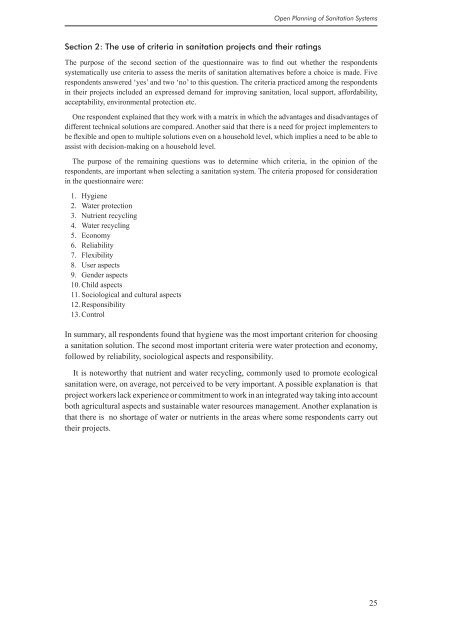
![Project Document [PDF: 2.31 MB] - EcoSanRes](https://img.yumpu.com/51279385/1/184x260/project-document-pdf-231-mb-ecosanres.jpg?quality=85)


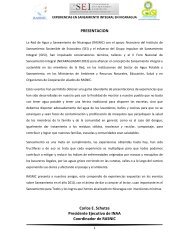
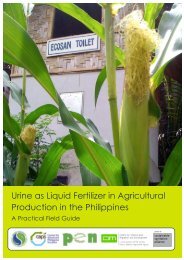
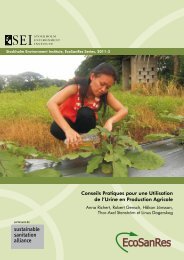
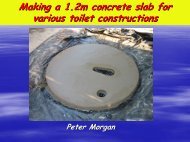

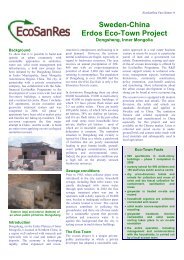


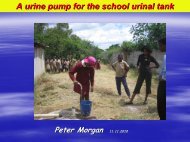

![Latrines à compost [high-resolution colour PDF: 12.3MB] - EcoSanRes](https://img.yumpu.com/31726141/1/185x260/latrines-a-compost-high-resolution-colour-pdf-123mb-ecosanres.jpg?quality=85)